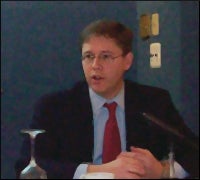 |
| FCC Chair Kevin Martin speaks at this week’s telecom symposium in Washington |
WASHINGTON — Is openness here to say?
Kevin Martin thinks so. Speaking here at the National Press Club yesterday, the Federal Communications Commission’s chairman weighed his oversight of major FCC efforts that, he said, guided the telecom industry toward greater network openness.
And, Martin added, he managed to do so without relying too much on the heavy hand of regulation.
During the annual telecom summit hosted here by the Phoenix Center, a Washington think tank, Martin talked of the balancing act between carriers — who are reluctant to open access to their networks — and the growing demands of device and application makers, who insist on an open-platform model.
In particular, he was pleased with the trend toward openness that had been set in motion during the FCC’s 700 MHz spectrum auction, which concluded earlier this year.
Under rules pushed by Martin, the winner of the most valuable swath of that spectrum, known as the C block, could use it to build a network only if they agreed to make it be compatible with all applications and devices.
“I think I was able to craft a compromise that did respect the ability of consumers to be able to go where they wanted to on the Internet and have it more open to applications and devices, and at the same time, have it shy away from the regulations that could inhibit investment in networks,” he said.
Verizon Wireless, the carrier that ultimately won the C block, sued over the FCC’s open-access conditions before the auction got underway. Eventually, however, the company withdrew its challenge.
Equally heartening for Martin was Sprint’s promise of openness in its ambitious joint WiMAX venture with Clearwire, which the FCC approved earlier this month. He also noted T-Mobile’s partnership with Google (NASDAQ: GOOG) to develop the G1 phone, the first device built on the open source Android platform.
“You’ve got a dramatic shift,” Martin said. “Within a year, you had the industry association saying something was technologically impossible to all of them embracing it and figuring out how they’re going to implement it.”
That association, CTIA, the trade group representing the wireless industry, dropped its own lawsuit against the open-access requirements for the 700 MHz spectrum last week, effectively putting to rest the final controversy over the issue.
To Martin’s mind, the carriers’ moves toward open-access provisions dispense with the need for more regulation, even if they took a little coaxing.
That’s why he reiterated his opposition to a petition from Skype, eBay’s Internet phone company, which asked the FCC to force carriers to open their networks to it and similar communications services. Martin has recommended that his fellow commissioners reject the petition, but that they do so without prejudice, meaning they could revisit the issue if access problems were to continue.
Next page: Martin’s next steps
Page 2 of 2
Martin’s future
In the meantime, the commission only has one more meeting scheduled this year, and the agenda for that meeting — or any going forward under Martin’s stewardship — remains uncertain.
With the government heading for a major upheaval on the eve of a new administration, Martin’s future at the FCC is in doubt as speculation mounts that the Republican chairman will step down early next year.
Talking with reporters after his presentation on Tuesday, Martin noted that presidential transitions — particularly from one party to another — are a strange time in Washington. He recalled eight years ago, when Chairman William Kennard hung on after the election to resolve some lingering issues, but resigned on Jan. 19, 2001, one day before George Bush took the oath of office.
Asked about his own future, Martin demurred.
“I don’t have any plans yet, and I’m still focused on getting as much done as we can,” he said.
The major items remaining on his list are reforms to the FCC’s intercarrier compensation rules and the Universal Service Fund (USF), a government subsidy for bringing phone service to underserved parts of the country.
Martin said he is interested in updating the fee structure that dictates how telecom providers compensate each other for communications that span multiple networks, and in including broadband in the USF. But he added that he is not optimistic that his fellow commissioners will be ready to vote on those issues by the Dec. 18 meeting.
Also up in the air is the FCC’s plan to allocate a portion of the wireless spectrum, known as AWS-3, in a scheme to create a free, nationwide broadband network. That proposal, backed by Silicon Valley startup M2Z Networks, has encountered fierce opposition from T-Mobile and other wireless carriers that warn the new network could interfere with their customers’ cellular and data services.
Martin said he’s unsure other commissioners will be ready to move on that issue, either.
Looking forward, Martin’s commission has its hands full with the transition from analog to digital television broadcasts, scheduled for Feb. 17, 2009.
The commission has been running a multi-pronged effort to ensure that the transition goes smoothly and that no Americans are caught by surprise when their analog TV reception is cut off. The FCC recently sent out letters of inquiry to cable providers around the country asking about the steps they were taking to prepare for the DTV transition.
Martin said that the responses of many of the providers were inadequate, particularly Comcast (NASDAQ: CMCSA), which “didn’t even answer the questions directly.”
“Different operators provided different levels of information,” he added, holding out the possibility of disciplinary action for those that didn’t comply. “Companies that didn’t provide sufficient answers would be subject to whatever the commission’s enforcement actions are, just as they always are.”


